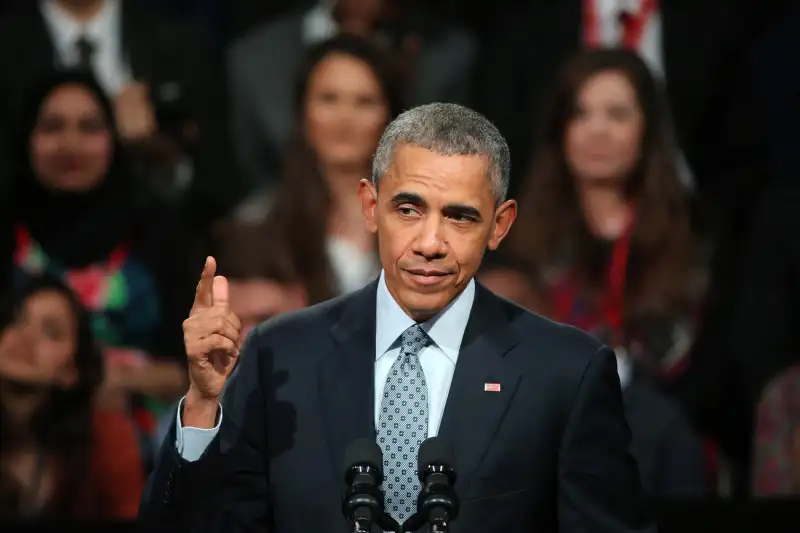What Really Happened to the Stock Market During the Obama Years
Money is not a client of any investment adviser featured on this page. The information provided on this page is for educational purposes only and is not intended as investment advice. Money does not offer advisory services.

While the economic recovery under President Obama has been sluggish and underwhelming, slow and disappointing are hardly words you would use to describe the stock market's performance under the outgoing president.
Since Obama's first inauguration on Jan. 20, 2009, U.S. equities have surged 12% a year, not counting dividends, in what turned out to be the second-longest bull market in history.
To put that in perspective, those price gains were nearly four percentage points per year more than domestic equities have averaged since the end of World War II. They also compare favorably to the 4.6% annual losses suffered by the S&P 500 index of U.S. stocks under the eight years of Obama's predecessor, President George W. Bush.
Here's one other way to think about it: If during the upcoming administration of President-elect Donald Trump, the stock market were to replicate the success it enjoyed under Obama, rising by a factor of 2.5, then the Dow Jones industrial average -- which currently stands at just under the 20,000 level -- would have to climb all the way up to 50,000.
How Obama Stacks Up Historically
The stock market's performance in the two terms under Obama represents "the second best run under a Democrat president," trailing only the 14.9% annual gains under Bill Clinton in the 1990s, according to Sam Stovall, chief investment strategist for the market research firm CFRA.
Among all presidents, the market's annualized gain under Obama ranks third behind Clinton and Gerald Ford -- although Ford presided over less than a single term.
Equities also gained nearly three percentage points more annually under Obama than under Ronald Reagan -- who, along with Clinton, is widely perceived as having been history's biggest benefactors to Wall Street. How is that possible? Unlike Reagan, who not only presided over a major bull market but also a couple of big stock slides -- the 1981-82 downturn and the October 1987 crash -- Obama's entire presidency unfolded in a bull market.
Can Obama Take the Credit?
Many market observers have pointed out that the stock market's run under Obama may not have been all or even mostly Obama's doing.
The 44th president of the United States got a huge assist from the Federal Reserve, which took the unusual position of keeping short-term interest rates near zero for almost the entire duration of Obama's two terms. The Fed, in fact, only lifted rates two times -- for a total of half a percentage point -- near the end of the Obama administration.
That unprecedented policy, which was enacted to prevent the economy from slipping into a deflationary spiral in the aftermath of the global financial crisis, was designed to promote risk taking in the economy. Investors who were earning virtually nothing by parking their money in cash or government bonds were forced to plow their money into equities to generate any return to speak of -- and that gave the markets a lift.
Making American Stocks Great Again
While interest rates have been at record lows around the world, the fact remains that U.S. stocks far outperformed other global markets.
Under Obama, U.S. stocks more than tripled investors' money, generating total returns (which include the value of reinvested dividends) of 235%. By comparison, shares of companies based in Europe, Japan, and other developed economies gained just 96% in total, according to the investment research firm Morningstar.
And overseas equities based in emerging economies like China and India fared only slightly better, posting gains of 110% over the past eight years -- still less than half what U.S. shares enjoyed. A big reason for that poor performance: Despite China's rapidly expanding economy, that country's equities gained only about a third as much as American equities. Russian shares fared even worse, meanwhile, losing more than a third of their value over the course of Obama's two terms.
Why You Aren't Happier About the Market
Despite the strong gains in the stock market, investors' enthusiasm has consistently been tepid throughout the Obama years. The Wells Fargo/Gallup Investor and Retirement Optimism index, for instance, still remains at a lower level than it was before the start of the global financial crisis began in 2007.
Meanwhile, Americans' ownership of equities has dwindled. A survey by Gallup last year found that only 52% of American adults were invested in the stock market -- down from 55% in 2015 and 65% in 2007, before the bear market and Great Recession began. You can chalk up a lot of this so-called enthusiasm gap to the sluggish economy and what had been a disappointing job market up until the last couple of years, with investors less likely to trust the market with their money.
Then again, there are other ways to measure investor sentiment. One is to look at the actual value that investors are placing on their investments -- that is, the amount that investors are willing to pay for each dollar of earnings.
And by that token, actual investor enthusiasm has soared under Obama.
Shortly after he took office in 2009, the price/earnings ratio for stocks in the S&P 500 stood at a historically low level of 13, based on 10 years of averaged corporate profits. The long-term historic average is 16 -- but today, the market's P/E (using this particular measure of earnings) has jumped to 28.5.
There have only been three other times in history that investors were willing to pay this much for stock earnings -- in the years leading up to the Great Depression, right before the Internet bubble in the late 1990s, and just before the financial crisis a decade ago.
That doesn't necessarily bode well for stocks going forward. Come Jan. 20, though, the stock market won't be Obama's problem anymore. That will fall to his successor, President Trump.
